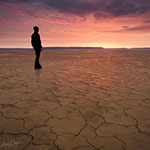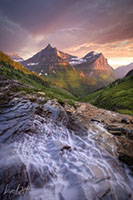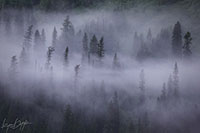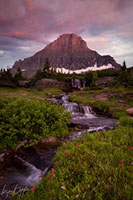
|
|
|||||
|
Featured Photographer, October 2010: Ryan Dyar
Our featured guest photographer at ApertureAcademy.com is professional career landscape photographer, Ryan Dyar. We want to sincerely thank Ryan for being generous with his time to answer our questions, and share some of his insights with us! Please visit his website and Flickr links to see more of his incredible work, and to let him know you enjoyed this interview. :: How did you get started in photography? Did you begin with film or go straight to digital? First, I'd like to thank you guys for this opportunity and say congratulations on the success of the Aperture Academy. I, like many landscape shooters, got started in landscape photography by my love for the outdoors. I grew as a snowboarder, which meant a lot of time spent in the mountains exploring, riding, hiking, and camping. Eventually my love for the alpine territories grew beyond the winter/spring snowboarding season and I began spending a lot of time hiking/backpacking just for the joy of being in the mountains. I used to bring a little point and shoot camera with me for snapshots and memories until I got my first DSLR. It's the classic snowball effect... I didn't start out wanting to be a photographer, but once you actually learn how to use your camera and your images begin to get better and better, you just get caught up in it and fall in love. I think having started with digital really helped in my quick progression. The instant feedback of a digital camera put the learning curve in my favor... Going from your basic "point and shoot" owner to now career photographer in just a couple years is a big leap. I would have never learned this fast with film, in my opinion. I do have a great amount of respect for film guys, however.
:: What do you find the biggest challenge is with landscape photography? The biggest challenge for me was learning patience, learning to take my time. I believe that patience is key in almost every aspect of landscape photography. While hiking or scouting a location, it's best to take things in slowly, get acquainted with the area. If you hurry to just get there and grab the first composition you find, you may miss something just around the corner. The same goes for processing your images. Slow down and take the time to pay attention to the details. It may take an extra 10 minutes, but if you spend the time finely masking your exposure blends you can avoid those nasty halos and harsh transitions. Things like this are what make an image stand out from the crowd. It took a long time for me to learn this, and I still am in many ways, but it really makes all the difference.
:: If you had to pick one place to spend an entire season photographing, which location and which season would you choose? Mountains are my favorite subjects, and though the western US and Canada have some stunning ranges, I'd have to choose the Himalayas in late summer/early fall. Fall in Patagonia is a very close second. Both hold some of the most majestic and beautifully rugged peaks in the world. I actually have plans to spend some time in the Himalayas later this year.
:: A lot of your work really shines in its post processing techniques. What would you say was the best "trick" you've learned in that arena? Well, this isn't really a trick, but one of the most useful processing tools in my workflow are Luminosity Masks. These are selections made up of specific tonal values which allow you to make adjustments to that luminosity level. It sounds complicated, but it's not. Being able to pin point these areas to make certain adjustments is really invaluable, they can be used for contrast adjustments, color adjustments, dodging and burning, blending exposures, etc. Tony Kuyper (the creator of this technique) has the actions as well as tutorials available on his site. He also has the actions for his Saturation Masks, I use these often as well, but that's a whole new paragraph.
:: What was the most miserable day you have spent photographing? I haven't had too many bad days shooting, just a few bad things. The scariest moment shooting would have to be the Grizzly Bear encounter I had (one of many) during a 4-mile hike back to my car after shooting sunset one evening in Glacier Park. I've read all the books and done plenty of research on bear safety, so I know that hiking in the dark is one of the biggest no-no's... but how else are you going to shoot sunset in a place you have to hike into but aren't allowed to camp at? Well, I'll make a long story short. A friend and I were hiking back when our headlamps caught two pairs of glowing eyes about 20ft in front of us on the trail. This turned out to be a Grizzly cub and sow. Well, after some huffing and puffing, ground stomping, and a charge that turned out to be a bluff just feet away, my friend and I managed to back off slowly enough to walk away. We ended up making a big loop off the trail through dark forests and tall ground foliage to avoid the bear. We eventually made our way back to the car, two hours later than we should have. It was definitely one of the longest nights of my life.
:: Any plans of ever adding portrait or wedding photography into the mix? What challenges do you anticipate they would create? I really just have no desire to shoot any type of portrait stuff. It's just not for me. I only shoot landscape photography because I love the outdoors. I think to be really good at something you have to have a passion for it, and I just have no passion for portrait work, although I can definitely enjoy and appreciate viewing it.
:: What was the best piece of advice or best lesson you ever received, photography wise? I'm a bit of a loaner when it comes to shooting, so I haven't really had anyone around to give me advice or lessons. But honestly, I have learned and been inspired most by landscape oil painters. Guys like Albert Bierstadt are just incredible. The way landscape painters handle light and dynamic range is really impressive, I credit my processing "look" to studying these oil guys. |
Photographer Spotlight Interviews
|
|
 |
Other Cool Stuff→ Past Workshop Photos → 72dpi.com → How-To Articles → Photographer of the Month |
 |
Contact Us→ Contact Us → About Us → Site Map |
© 2009-2024 Aperture Academy, Inc.









